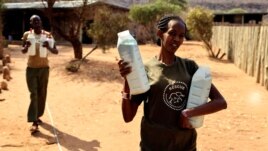New variants of the coronavirus can keep appearing as long as the virus that caused the COVID-19 pandemic keeps infecting people. But that does not mean they will be more dangerous.
只要导致新冠肺炎大流行的病毒不断感染人们,新冠病毒的新变种就会不断出现。但是这并不意味着它们会变得更加危险。
With more than half of the world still not vaccinated, the virus will likely keep finding people to infect. It will then create copies of itself for several months or years to come. And each time a virus makes a copy of itself, a small mutation could happen. Those changes could help the virus survive and become new variants.
由于全球仍有一半以上人口未接种疫苗,这种病毒可能会继续寻找人们去感染。然后它会在之后的几个月或几年内造出自己的复制品。每次病毒自我复制时,都可能会发生突变。这种突变可以帮助病毒存活并成为新的变种。
Andrew Read is a virus expert at Pennsylvania State University. He said when a virus infects a new body, it needs to change itself to agree with the body so it can spread more widely.
安德鲁·雷德是宾夕法尼亚州立大学的病毒专家。他表示,当病毒感染一个新的身体时,它需要改造自己以适应这个身体,这样它才能更广泛传播。
The U.S. Centers for Disease Control and Prevention has found that the Delta variant can spread two times faster than earlier versions of the virus.
美国疾控预防中心发现,德尔塔变种的传播速度比初期版本的病毒要快两倍。
Dr. Adam Lauring is a virus and infectious disease expert at the University of Michigan. He said while the virus could still mutate to become more infectious, it probably would not double the rate it can spread again. Lauring added, "there is not an infinite number of things it can do."
亚当·劳林博士是密歇根大学的病毒和传染病专家。他说,虽然病毒仍然可能变异,变得更具传染性,但是它的传播速度可能不会再次翻倍。劳林表示:“它能做的事情并非无限的。”
It is possible that the virus could become deadlier. But experts believe it is not likely to happen. Extremely sick people are also less likely to socialize and spread the virus to others.
这种病毒可能会变得更加致命。但是专家表示这不太可能发生。重症患者也更不可能与人交际并将病毒传播给他人。
Experts are now watching to see if new variants could be better at avoiding the protection people gain from vaccination and infections.
专家们现在正在观察新变种是否可以更好地避开人们从疫苗接种和感染中获得的保护。
Dr. Joshua Schiffer is a virus expert at the Fred Hutchinson Cancer Research Center in Seattle, Washington. He said as more people get the shots, the virus would have to spread through people who have some defense against the virus, or immunity, for it to survive.
约书亚·希弗博士是华盛顿州西雅图市弗雷德·哈钦森癌症研究中心的病毒专家。他说,随着越来越多人接种疫苗,病毒必须通过对其有一定防护或免疫力的人群传播才能生存下去。
"The virus could take on a mutation that makes the immune response less effective," he said.
他说:“病毒可能会发生突变,使免疫反应没那么有效。”
If that happens, scientists may suggest that vaccines be changed with new information to fight appearing variants. It would be like how shots for the flu, another virus, are changed every year.
如果发生这种情况,科学家可能会建议采用新的信息改造疫苗,以对抗新出现的变种。这就像针对流感病毒的疫苗每年都在变化一样。
I'm Gregory Stachel.
我是格雷戈里·斯塔切尔。(51VOA.COM原创翻译,请勿转载,违者必究!)
By Gregory Stachel
01 November 2021
New variants of the coronavirus can keep appearing as long as the virus that caused the COVID-19 pandemic keeps infecting people. But that does not mean they will be more dangerous.
With more than half of the world still not vaccinated, the virus will likely keep finding people to infect. It will then create copies of itself for several months or years to come. And each time a virus makes a copy of itself, a small mutation could happen. Those changes could help the virus survive and become new variants.
Andrew Read is a virus expert at Pennsylvania State University. He said when a virus infects a new body, it needs to change itself to agree with the body so it can spread more widely.
The U.S. Centers for Disease Control and Prevention has found that the Delta variant can spread two times faster than earlier versions of the virus.
 The Centers for Disease Control and Prevention (CDC) in Atlanta on March 19, 2021. The U.S. Centers for Disease Control and Prevention has found that the Delta variant can spread two times faster than earlier versions of the virus. (AFP/Baradat)
The Centers for Disease Control and Prevention (CDC) in Atlanta on March 19, 2021. The U.S. Centers for Disease Control and Prevention has found that the Delta variant can spread two times faster than earlier versions of the virus. (AFP/Baradat)Dr. Adam Lauring is a virus and infectious disease expert at the University of Michigan. He said while the virus could still mutate to become more infectious, it probably would not double the rate it can spread again. Lauring added, "there is not an infinite number of things it can do."
It is possible that the virus could become deadlier. But experts believe it is not likely to happen. Extremely sick people are also less likely to socialize and spread the virus to others.
Experts are now watching to see if new variants could be better at avoiding the protection people gain from vaccination and infections.
Dr. Joshua Schiffer is a virus expert at the Fred Hutchinson Cancer Research Center in Seattle, Washington. He said as more people get the shots, the virus would have to spread through people who have some defense against the virus, or immunity, for it to survive.
"The virus could take on a mutation that makes the immune response less effective," he said.
If that happens, scientists may suggest that vaccines be changed with new information to fight appearing variants. It would be like how shots for the flu, another virus, are changed every year.
I'm Gregory Stachel.
Christina Larson reported this story for The Associated Press. Gregory Stachel adapted it for VOA Learning English. Hai Do was the editor.
Words in This Story
variant – n. something that is different in some way from others of the same kind
mutate – v. to cause (a gene) to change and create an unusual characteristic in a plant or animal
infinite – adj. having no limits
response – n. something that is done as a reaction to something else














